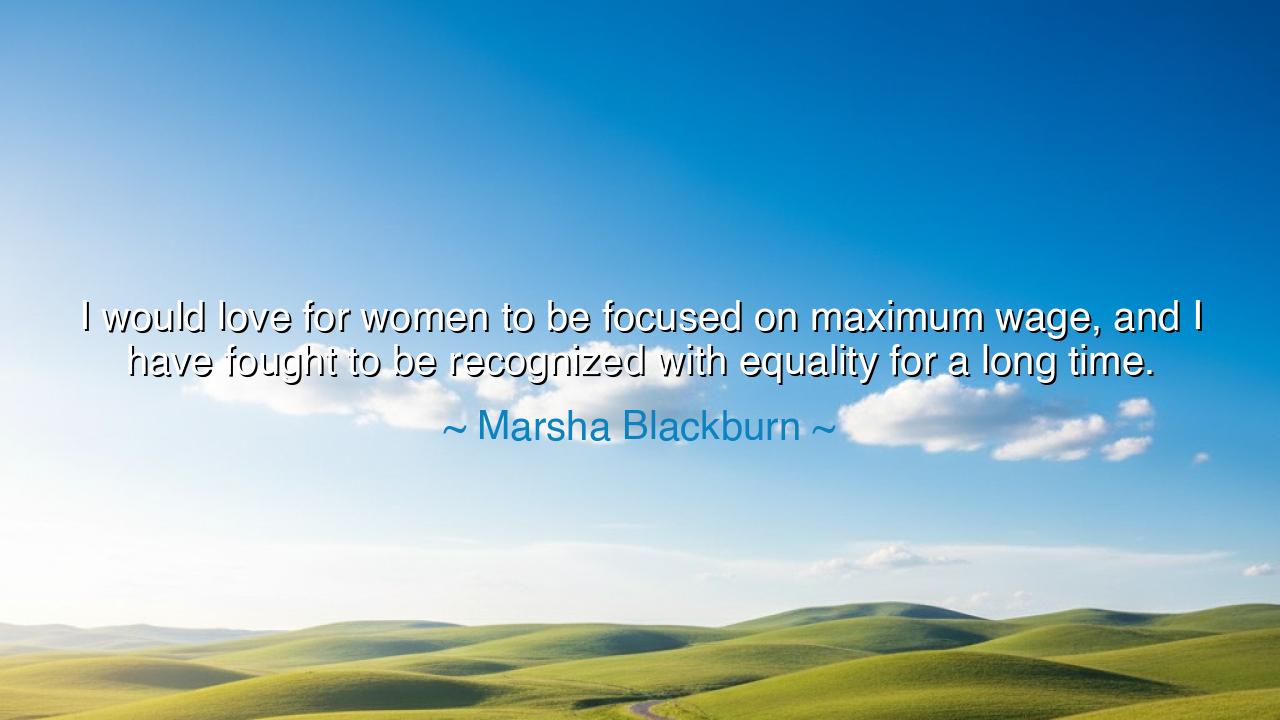
I would love for women to be focused on maximum wage, and I have
I would love for women to be focused on maximum wage, and I have fought to be recognized with equality for a long time.






The words of Marsha Blackburn, “I would love for women to be focused on maximum wage, and I have fought to be recognized with equality for a long time,” carry both conviction and defiance — the tone of one who has walked through struggle and demands recognition not merely in theory but in deed. Beneath her statement lies a truth as old as civilization itself: that equality is not achieved by lowering ceilings, but by raising horizons. Her desire that women focus on the “maximum wage” speaks not only of economic freedom, but of the broader human calling to strive toward greatness without apology, without limit, and without fear of judgment.
To understand the power of her words, we must first understand their origin. Marsha Blackburn, an American legislator and one of the first women to rise to prominence within her political sphere, has long spoken of women’s capacity to compete, lead, and shape the world on equal terms with men. Her phrase “maximum wage” was not meant as mockery of fairness, but as a challenge — a call to aim higher. For centuries, the battle for women’s rights has focused on achieving equality in opportunity, pay, and recognition. But Blackburn, like the visionaries of old, urges that the fight not stop at equality of access but move toward excellence of achievement. She dreams not of leveling the field merely for fairness, but of seeing women reach the farthest summits of human potential.
In the ancient world, this ideal found form in figures like Hypatia of Alexandria, the philosopher and mathematician who dared to teach in the great libraries of her time when women were forbidden to lead in thought. She did not fight for minimum acceptance — she demanded intellectual mastery. Her life, like Blackburn’s sentiment, reminds us that equality must evolve from being a shield into being a sword — not simply a protection from injustice, but a force for advancement. When Hypatia stood before her male students and spoke of the stars, she embodied what Blackburn calls the pursuit of the “maximum” — not wage alone, but the fullness of human worth.
To speak of the “maximum wage” is also to confront the mindset of limitation that too often governs society’s treatment of women. For generations, women were told to be content with “enough” — enough recognition, enough respect, enough pay to survive. Blackburn’s words challenge this complacency. She reminds the world that equality is not the destination but the beginning of the race. True empowerment is not measured by what one is given, but by what one dares to claim. The ancient philosophers would have called this the spirit of areté — excellence born of purpose. It is the refusal to live small when the soul was made for greatness.
Yet her words also speak of struggle — of the long and weary fight “to be recognized with equality.” For every woman who has reached the heights of influence, there are countless others whose work was unseen, whose worth was measured by others rather than by themselves. In this, Blackburn echoes the same cry that moved Sojourner Truth, who once asked, “Ain’t I a woman?” — demanding that her humanity be acknowledged in a world that had denied it. Both women, in their own ways, speak from the heart of perseverance: the demand not just to exist beside men, but to stand as equals in dignity and destiny.
There is, too, a deeper wisdom hidden in her phrasing. To “focus on maximum wage” is not merely to seek wealth but to embrace self-mastery — the highest return on one’s gifts, time, and labor. The ancients would have understood this as the pursuit of one’s divine potential — the commitment to work not for validation, but for fulfillment. In that pursuit, equality is not granted by others but proven by deeds. Every woman who builds, leads, invents, heals, or teaches partakes in this sacred act of creation. And every man who honors that labor fulfills his own share of justice.
Let this, then, be the lesson drawn from her words: equality is not a finish line; it is the starting line of greatness. Seek not to be equal merely in status, but in ambition. Do not measure yourself against what others have allowed you to earn — measure yourself against what you are capable of giving to the world. The wage she speaks of is not just material; it is moral, intellectual, and spiritual — the reward of living boldly and without apology.
Thus, Marsha Blackburn’s declaration becomes more than a political statement — it is a teaching of endurance and aspiration. It reminds us that equality is only meaningful when it bears fruit in action. To the daughters of tomorrow, she offers a challenge: rise beyond fairness; aim for fullness. The measure of your worth lies not in what you are paid, but in how greatly you dare to live. For when justice is paired with ambition, and equality with excellence, humanity itself advances — and the world is made stronger, freer, and more whole.






AAdministratorAdministrator
Welcome, honored guests. Please leave a comment, we will respond soon